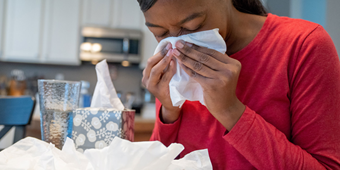How to Help Others Manage Your Child’s Asthma

Find Your Perfect Match
Answer a few questions and we'll provide you with a list of primary care providers that best fit your needs.
Much as you might want to, you can’t always keep your child with asthma near you. As your youngster grows older and heads off to school, extracurricular activities and friends’ homes, make sure that caregivers are prepared to manage your child’s asthma. Whether at play practice, a soccer game, or with grandma and grandpa, those in charge need some education on what to do if your child’s asthma flares up. Use these talking points to get the conversation started.
Anyone who takes care of your child should have a copy of your child’s asthma action plan.
Items to Discuss with School
- Your child’s asthma action plan. Make sure you have an up-to-date copy of your child's plan. If you don’t have one yet, call your child's doctor and start one right away. Go over the plan at a meeting with your child’s school. Discuss how severe your child’s asthma is and walk, step-by-step, through the items on the action plan, including important phone numbers to use in case of an emergency.
- Inhalers, peak flow meters and medications. Make sure the staff knows how to help your child use his inhaler and peak flow meter. Talk about any release forms that might be needed to allow your child to carry his own inhaler. Go over medications your child takes and any related side effects.
- School policies. Ask how your child will get access to her medications, how field trips and after-school activities are handled, and what happens in the event of an emergency.
- Your child’s asthma triggers. What sets off your child’s asthma? Keep in mind class pets, mold, cleaning products, tobacco smoke, and other scented products such as perfumes or lotions. If colds or the flu trigger asthma, make sure staff watches for early signs like a stuffy or runny nose, sneezing or sore throat.
- Asthma attacks. Be sure the school staff knows what to do if your child’s symptoms start to get worse or if she has an asthma attack. Refer to your child's action plan.
- The best way to communicate. How will you be notified if your child is avoiding activities in phys ed or is too embarrassed to visit the school nurse for her medicine? Talk about what’s best for both you and the school, be it an email, phone call, or text message.
Items to Discuss with Other Caregivers
- Your child’s asthma action plan. Anyone who takes care of your child should have a copy of your child’s asthma action plan. Walk through the whole plan with them the same way you did during your school meeting.
- When asthma symptoms worsen. Anyone watching your child needs to know what to do if symptoms get worse or if he has an asthma attack.
- Sleepover essentials. Before your child visits a new friend, talk to his family. Explain your child’s asthma and ask about triggers in the household. Make sure your child won’t be around second-hand smoke. Consider hosting play dates and sleepovers at your home if his asthma is triggered at a friend’s house.
- Emergency situations. Exchange phone numbers, the best way to reach you, and instructions on what to do in case there’s an emergency.
Items to Discuss with Your Child
You can have talking points with your child, too! Make sure you have age-appropriate conversations with her about her asthma. She’ll be living with this condition, so she should have a good understanding of it. Your discussions will vary and become more detailed as she grows. Teach her to talk about her condition with others so she can ask for help when she needs it. By educating her at a young age, you’ll be helping to empower her for years to come.
Find Your Perfect Match
Answer a few questions and we'll provide you with a list of primary care providers that best fit your needs.
Source: American Academy of Pediatrics




